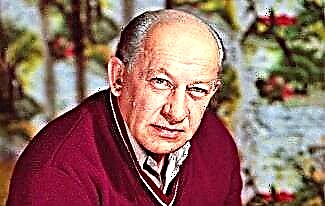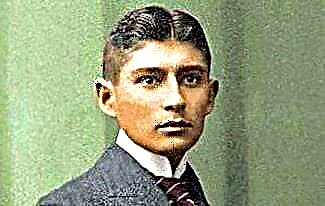Aristotle - Ancient Greek philosopher, naturalist, student of Plato. Mentor of Alexander the Great, founder of the peripatetic school and formal logic. He is considered the most influential philosopher of antiquity, who laid the foundations of modern natural sciences.
There are many interesting facts in the biography of Aristotle, which will be discussed in this article.
So, before you is a short biography of Aristotle.

Biography of Aristotle
Aristotle was born in 384 BC. in the city of Stagira, located in the north of Eastern Greece. In connection with his place of birth, he was often called Stagirite.
The philosopher grew up and was brought up in the family of the hereditary doctor Nicomachus and his wife Festis. An interesting fact is that Aristotle's father was the court physician of the Macedonian king Amynta III - the grandfather of Alexander the Great.
Childhood and youth
Aristotle began to study various sciences at an early age. The boy's first teacher was his father, who over the years of his biography wrote 6 works on medicine and one book on natural philosophy.
Nicomachus strove to give his son the best possible education. In addition, he wanted Aristotle to become a physician as well.
It is worth noting that the father taught the boy not only the exact sciences, but also philosophy, which was very popular at that time.
Aristotle's parents died when he was still a teenager. As a result, the husband of his older sister named Proxen took over the education of the young man.
In 367 BC. e. Aristotle went to Athens. There he became interested in the teachings of Plato, later becoming his student.

At that time, the biography, an inquisitive guy was interested not only in philosophy, but also in politics, biology, zoology, physics and other sciences. It is worth noting that he studied at Plato's academy for about 20 years.
After Aristotle formed his own views on life, he criticized Plato's ideas regarding the disembodied essence of all things.
The philosopher developed his theory - the primacy of form and matter, and the inseparability of the soul from the body.
Later, Aristotle received an offer from King Philip II to move to Macedonia to raise young Alexander. As a result, he was the teacher of the future commander for 8 years.
When Aristotle returned back to Athens, he opened his philosophical school "Lyceum", better known as the peripatetic school.
Philosophical teaching
Aristotle divided all sciences into 3 categories:
- Theoretical - metaphysics, physics and metaphysics.
- Practical - ethics and politics.
- Creative - all forms of art, including poetry and rhetoric.
The philosopher's teachings were based on 4 main principles:
- Matter is “that from which”.
- Form is "what".
- The producing cause is "from where."
- The goal is "what for what."
Depending on the data of the origin, Aristotle attributed the actions of the subjects to the good or the evil deed.
The philosopher was the founder of a hierarchical system of categories, of which there were exactly 10: suffering, position, essence, attitude, quantity, time, quality, place, possession and action.
Everything that exists is divided into inorganic formations, the world of plants and living beings, the world of different types of animals and humans.

Over the next few centuries, the types of state apparatus that Aristotle described were practiced. He presented his vision of an ideal state in the work "Politics".
According to the scientist, each individual is realized in society, since he lives not only for himself. With other people, he is associated with family, friendship and other types of relationships.
According to the teachings of Aristotle, the goal of civil society is not only economic development, but also in the desire to achieve the common good - eudemonism.
The thinker noted 3 positive and 3 negative forms of government.
- Positive - monarchy (autocracy), aristocracy (rule of the best) and polity (state).
- The negative ones are tyranny (the rule of a tyrant), oligarchy (the rule of the few) and democracy (the rule of the people).
In addition, Aristotle paid great attention to art. For example, thinking about the theater, he concluded that the presence of the phenomenon of imitation, which is inherent in man, gives him real pleasure.
One of the fundamental works of the ancient Greek philosopher is the composition "On the Soul". In it, the author raises many metaphysical questions related to the life of the soul of any creature, defining the difference between the existence of man, animal and plant.
In addition, Aristotle reflected on the senses (touch, smell, hearing, taste and sight) and the 3 abilities of the soul (growth, sensation and reflection).
It is worth noting that the thinker studied all the sciences that existed in that era. He has written many books on logic, biology, astronomy, physics, poetry, dialectics and other disciplines.
The collection of works of the philosopher is called “Aristotle's Corpus”.
Personal life
We know almost nothing about Aristotle's personal life. It is known that over the years of his biography, he was married twice.
The first wife of the scientist was Pythias, who was the adopted daughter of the tyrant Assos of Troas. In this marriage, the girl Pythias was born.

After the death of his wife, Aristotle illegally married the servant Herpellis, who bore him a son, Nicomachus.
The sage was a direct and emotional person, especially when it came to philosophy. Once he quarreled with Plato so seriously, disagreeing with his ideas, that he began to avoid a chance meeting with a student.
Death
After the death of Alexander the Great, revolts against Macedonian rule began to emerge more and more often in Athens. At this period in the biography of Aristotle, as a former mentor of the commander, many were accused of atheism.
The thinker had to leave Athens in order to avoid the sad fate of Socrates - poisoned with poison. The phrase "I want to save the Athenians from a new crime against philosophy" uttered by him, subsequently gained great popularity.
Soon, the sage, along with his students, went to the island of Evia. 2 months later, in 322 BC, Aristotle died of a progressive stomach disease. At that time he was 62 years old.
Photo by Aristotle











